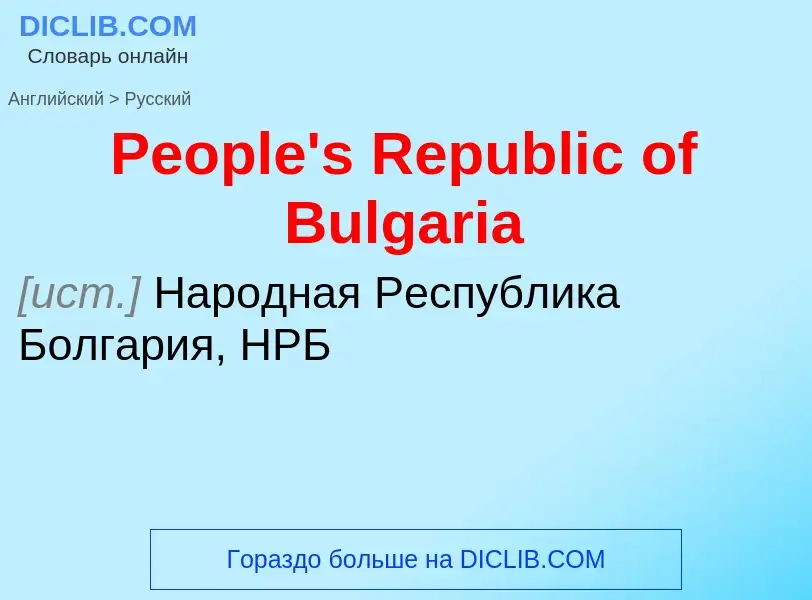Traducción y análisis de palabras por inteligencia artificial ChatGPT
En esta página puede obtener un análisis detallado de una palabra o frase, producido utilizando la mejor tecnología de inteligencia artificial hasta la fecha:
- cómo se usa la palabra
- frecuencia de uso
- se utiliza con más frecuencia en el habla oral o escrita
- opciones de traducción
- ejemplos de uso (varias frases con traducción)
- etimología
People's Republic of Bulgaria - traducción al ruso
[bʌl'ge(ə)riə]
существительное
география
Болгария
Definición
.
Wikipedia
The People's Republic of Bulgaria (PRB; Bulgarian: Народна република България (НРБ), pronounced [nɐˈrɔdnɐ rɛˈpublikɐ bɐɫˈɡarijɐ] Narodna republika Bŭlgariya, NRB), from 1990 onwards known as Republic of Bulgaria (Bulgarian: Република България, Republika Bŭlgariya), was the official name of Bulgaria when it was a socialist republic from 1946 to 1990, ruled by the Bulgarian Communist Party (BCP) together with its coalition partner, the Bulgarian Agrarian People's Union. Bulgaria was closely allied and one of the most loyal satellite states of the Soviet Union during the Cold War, sometimes being called the 16th Soviet Republic rather than an independent country. Bulgaria was also part of Comecon as well as a member of the Warsaw Pact. The Bulgarian resistance movement during World War II deposed the Kingdom of Bulgaria administration in the Bulgarian coup d'état of 1944 which ended the country's alliance with the Axis powers and led to the People's Republic in 1946.
The BCP modeled its policies after those of the Soviet Union, transforming the country over the course of a decade from an agrarian peasant society into an industrialized socialist society. In the mid-1950s and after the death of Stalin, the party's hardliners lost influence and a period of social liberalization and stability followed under Todor Zhivkov. Varying degrees of conservative or liberal influence followed. After a new energy and transportation infrastructure was constructed, by 1960 manufacturing became the dominant sector of the economy and Bulgaria became a major exporter of household goods and later of computer technologies, earning it the nickname of "Silicon Valley of the Eastern Bloc". The country's relatively high productivity levels and high scores on social development rankings made it a model for other socialist countries' administrative policies.
In 1989, after a few years of liberal influence, political reforms were initiated and Todor Zhivkov, who had served as head of the party since 1954, was removed from office in a BCP congress. In 1990, under the leadership of Aleksandar Lilov, the BCP changed its name to the Bulgarian Socialist Party (BSP) and adopted social democracy and democratic socialism in place of Marxism–Leninism. Following the BSP victory in the 1990 election, which was the first openly contested multi-party election since 1931, the name of the state was changed to the Republic of Bulgaria. Geographically, the People's Republic of Bulgaria had the same borders as present-day Bulgaria and it bordered the Black Sea to the east; Romania to the north; Yugoslavia (via SRs Serbia and Macedonia) to the west and Greece and Turkey to the south. The first elected president Zhelyu Zhelev was inaugurated on 1 August 1990 and became the first oppositional president of Bulgaria in the People's Republic. On 15 November 1990 after the elections the Bulgarian People's Republic was officially renamed to the Republic of Bulgaria. On 5 April 1991 with the new Constitution of Bulgaria all the symbols of the Bulgarian People's Republic were officially dissolved.



![Pre-fabricated apartment blocks in [[Mladost, Sofia]] Pre-fabricated apartment blocks in [[Mladost, Sofia]]](https://commons.wikimedia.org/wiki/Special:FilePath/Mladost3.jpg?width=200)
.jpg?width=200)

